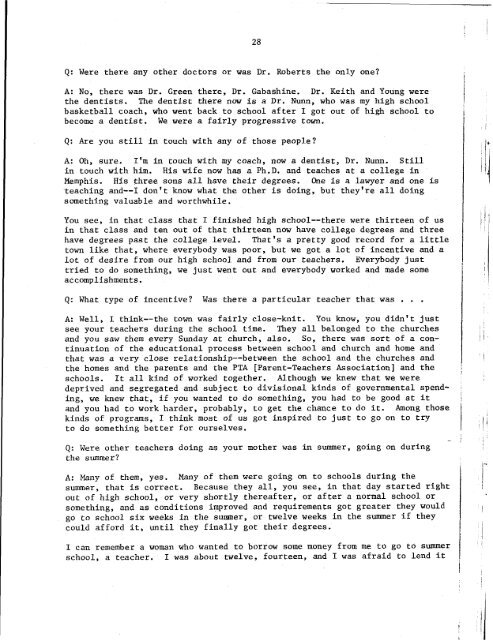Cecil A. Partee Memoir - University of Illinois Springfield
Cecil A. Partee Memoir - University of Illinois Springfield
Cecil A. Partee Memoir - University of Illinois Springfield
You also want an ePaper? Increase the reach of your titles
YUMPU automatically turns print PDFs into web optimized ePapers that Google loves.
Q: Were there any other doctors or was Dr. Roberts the only one?<br />
A: No, there was Dr. Green there, Dr. Gabashine. Dr. Keith and Young were<br />
the dentists, The dentist there now is a Dr. Nunn, who was my high school<br />
basketball coach, who went back to school after I got out <strong>of</strong> high school to<br />
become a dentist. We were a fairly progressive town.<br />
Q: Are you still in touch with any <strong>of</strong> those people?<br />
A: Oh, sure. I'm in touch with my coach, now a dentist, Dr. Nunn. Still<br />
in touch with him. His wife now has a Ph.D. and teaches at a college in<br />
Memphis. His three sons all have their degrees. One is a lawyer and one is<br />
teaching and--I don't know what the other is doing, but they're all doing<br />
something valuable and worthwhile.<br />
You see, in that class that I finished high school--there were thirteen <strong>of</strong> us<br />
in that class and ten out <strong>of</strong> that thirteen now have college degrees and three<br />
have degrees past the college level. That's a pretty good record for a little<br />
town like that, where everybody was poor, but we got a lot <strong>of</strong> incentive and a<br />
lot <strong>of</strong> desire from our high school and from our teachers. Everybody just<br />
tried to do something, we just went out and everybody worked and made some<br />
accomplishaents.<br />
Q: What type <strong>of</strong> incentive? Was there a particular teacher that was . . .<br />
A: Well, I think--the town was fairly close-knit. You know, you didn't just<br />
see your teachers during the school time. They all belonged to the churches<br />
and you saw them every Sunday at church, also. So, there was sort <strong>of</strong> a continuation<br />
<strong>of</strong> the educational process between school and church and home and<br />
that was a very close relationship--between the school and the churches and<br />
the homes and the parents and the PTA [Parent-Teachers Association] and the<br />
schools. It all kind <strong>of</strong> worked together. Although we knew that we were<br />
deprived and segregated and subject to divisional kinds <strong>of</strong> governmental spending,<br />
we knew that, if you wanted to do something, you had to be good at it<br />
and you had to work harder, probably, to get the chance to do it. Among those<br />
kinds <strong>of</strong> programs, I think most <strong>of</strong> us got inspired to just to go on to try<br />
to do something better for ourselves.<br />
-<br />
Q: Were other teachers doing as your mother was in summer, going on during<br />
the summer?<br />
A: Many <strong>of</strong> them, yes. Many <strong>of</strong> them were going on to schools during the<br />
summer, that is correct. Because they all, you see, in that day started right<br />
out <strong>of</strong> high school, or very shortly thereafter, or after a normal school or<br />
something, and as conditions improved and requirements got greater they would<br />
go to school six weeks in the sumner, or twelve weeks in the summer if they<br />
could afford it, until they finally got their degrees.<br />
1 can remember a woman who wanted to borrow some money from me to go to summer<br />
school, a teacher. I was about twelve, fourteen, and I was afraid to lend it
















